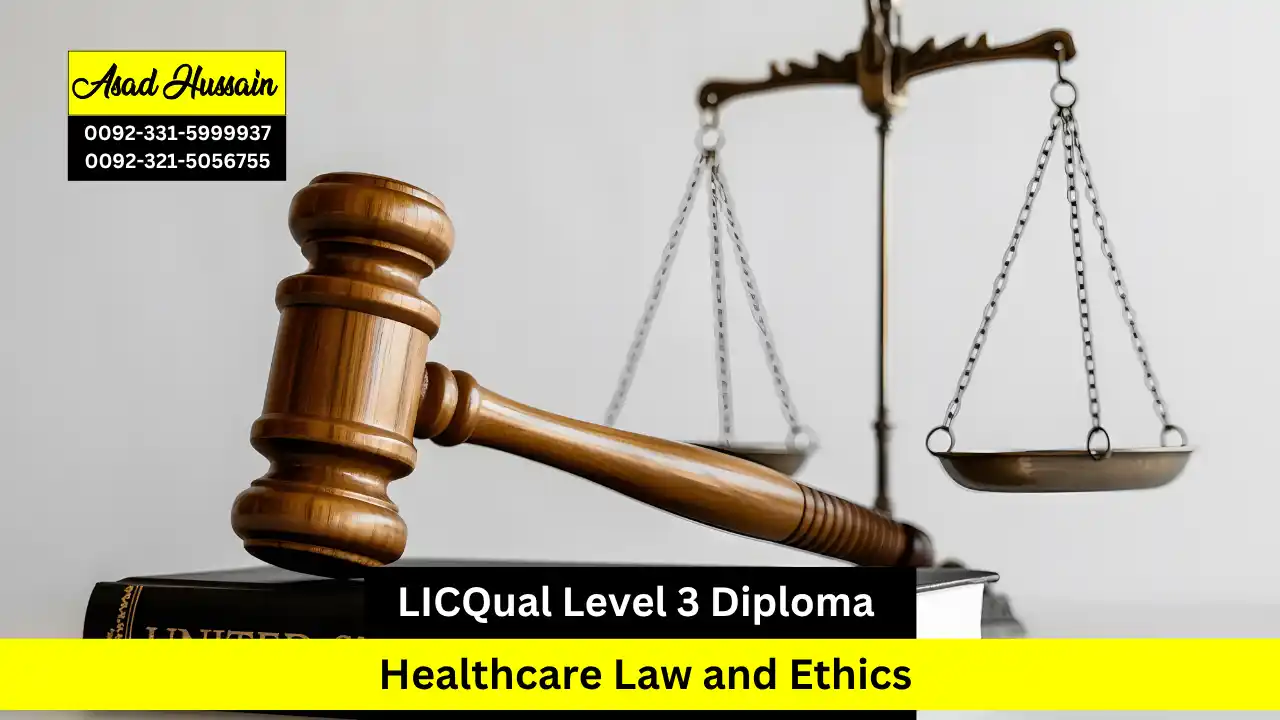The LICQual Level 3 Diploma in Healthcare Law and Ethics is a highly relevant qualification designed for individuals seeking to understand the legal and ethical frameworks that guide modern healthcare. In today’s complex healthcare systems, professionals are required to balance patient rights, legal compliance, and ethical decision-making while maintaining the highest standards of care. This diploma provides a strong foundation in healthcare law, medical ethics, and professional accountability, making it an essential program for those aspiring to advance their knowledge and careers in the healthcare sector.
LICQual Level 3 Diploma in Healthcare Law and Ethics explores critical topics such as patient confidentiality, consent, professional liability, healthcare policies, and the ethical dilemmas that arise in medical practice. Learners will gain a thorough understanding of how legal and ethical principles impact clinical decisions, patient care, and healthcare governance. By integrating both theory and practice, the LICQual Level 3 Diploma in Healthcare Law and Ethics equips learners with the ability to analyze complex issues and apply appropriate solutions in real-world healthcare settings.
One of the key objectives of this diploma is to prepare learners to navigate the challenges of ethical dilemmas and legal obligations with confidence. From understanding malpractice and negligence laws to addressing bioethical issues such as end-of-life care and genetic testing, this qualification ensures participants develop advanced critical thinking and decision-making skills.
Learners will also enhance their professional competencies in leadership, compliance, and governance. By mastering the principles of healthcare law and ethics, they will be able to support organizational integrity, improve patient outcomes, and contribute to safer and more accountable healthcare environments.
Upon completion of the program, graduates of the LICQual Level 3 Diploma in Healthcare Law and Ethics will be well-positioned for roles in healthcare administration, compliance management, patient advocacy, and clinical leadership. The qualification also provides a progression pathway to advanced studies in healthcare management, law, and bioethics, strengthening professional recognition in the global healthcare industry.
Program Highlights
Mandatory Units
- Principles of Healthcare Law
- Ethical Theories and Principles in Healthcare
- Patient Rights, Consent, and Confidentiality
- Duty of Care, Professional Accountability, and Legal Obligations
- Safeguarding, Risk Management, and Regulatory Compliance
- Ethical Decision-Making and Case Studies in Healthcare Practice
The LICQual Level 3 Diploma in Healthcare Law and Ethics is designed for individuals aspiring to build expertise in understanding and applying legal and ethical principles within healthcare systems, while developing skills in governance, compliance, and professional decision-making. To ensure learners are well-prepared for the academic and professional requirements of this qualification, specific entry requirements are established to maintain the quality and integrity of the program.
Age Requirements:
- Applicants must be at least 18 years old at the time of enrolment.
- Candidates under 18 may be considered only with written parental or guardian consent and evidence of maturity and readiness for higher-level study.
Educational Requirements:
- A minimum of a high school diploma (or equivalent) is required.
- Previous study in healthcare, law, ethics, management, or social sciences is advantageous but not mandatory.
Professional Experience:
- While not compulsory, 1–2 years of experience in healthcare, administration, legal compliance, or related fields is preferred.
- Practical exposure to healthcare governance, policy-making, or ethical decision-making provides learners with a stronger foundation for the program.
English Language Proficiency:
- Strong English reading, writing, and communication skills are essential for successfully completing this diploma.
- International applicants must provide proof of English proficiency through recognized assessments such as IELTS (minimum score of 5.5) or an equivalent qualification.
Learners who meet these entry requirements will be well-prepared to excel in the LICQual Level 3 Diploma in Healthcare Law and Ethics, gaining essential knowledge and skills to navigate legal frameworks, resolve ethical dilemmas, and ensure compliance in healthcare practices. This qualification also serves as a progression pathway to advanced studies, such as the LICQual Level 4 Diploma in Healthcare Management, enabling learners to strengthen their professional development and recognition in the global healthcare sector.
The LICQual Level 3 Diploma in Healthcare Law and Ethics equips learners with essential knowledge, practical skills, and professional competencies required to address legal frameworks, ethical dilemmas, and governance issues within healthcare systems. In today’s complex healthcare environment, organizations face growing challenges related to patient rights, data protection, professional accountability, and ethical decision-making. This diploma ensures learners develop the expertise to navigate legal requirements, promote ethical practices, and uphold compliance standards. Upon completing this qualification, learners will demonstrate strong capabilities in healthcare governance, law, ethics, and professional responsibility to enhance quality, safety, and trust in healthcare delivery.
Fundamentals of Healthcare Law and Ethics:
Understand the foundational principles, scope, and significance of law and ethics in modern healthcare systems.
Explore the relationship between legal compliance, ethical conduct, and improved healthcare outcomes.
Examine legal and ethical frameworks governing healthcare practice, professional duties, and patient rights.
Identify common ethical dilemmas and legal risks encountered in diverse healthcare environments.
Develop the ability to apply ethical reasoning and legal frameworks to real-world healthcare challenges.
Patient Rights, Consent, and Confidentiality:
Learn about legal and ethical requirements concerning informed consent and patient autonomy.
Understand the principles of patient confidentiality, privacy rights, and data protection regulations.
Analyze case studies on breaches of consent and confidentiality to strengthen professional practice.
Examine legal obligations under international and national healthcare regulations.
Develop frameworks to balance patient safety, autonomy, and professional responsibility.
Healthcare Governance, Regulation, and Accountability:
Gain knowledge of healthcare governance structures, regulatory frameworks, and compliance standards.
Understand the role of professional accountability and liability in healthcare decision-making.
Examine the impact of policies, codes of conduct, and organizational governance on daily practice.
Apply governance principles to ensure patient safety, quality care, and ethical service delivery.
Strengthen skills in risk management, compliance monitoring, and healthcare regulation enforcement.
Ethical Decision-Making and Professional Conduct:
Explore ethical theories and frameworks guiding healthcare professionals in complex situations.
Develop skills to resolve conflicts between ethical obligations and practical challenges in care delivery.
Examine real-world scenarios involving moral dilemmas, resource allocation, and duty of care.
Apply professional codes of ethics to guide decision-making in challenging healthcare contexts.
Promote integrity, fairness, and respect for diversity in all healthcare practices.
Legal Aspects of Healthcare Practice:
Learn about medical negligence, malpractice, and liability in healthcare service delivery.
Understand laws related to healthcare contracts, employment, and organizational responsibilities.
Examine healthcare law in relation to public health, safety, and emergency regulations.
Analyze the legal implications of technological advances, digital health, and medical innovations.
Develop practical strategies to minimize legal risks and ensure compliance with regulatory frameworks.
Contemporary Issues in Healthcare Law and Ethics:
Examine current debates in healthcare such as euthanasia, reproductive rights, and end-of-life care.
Understand the legal and ethical dimensions of genetic testing, biotechnology, and AI in healthcare.
Evaluate ethical challenges in global healthcare, including equity, access, and social justice.
Apply critical thinking to analyze evolving healthcare laws and ethical dilemmas.
Strengthen professional competence in addressing emerging issues with confidence and integrity.
Professional Development and Career Progression:
Develop skills for lifelong learning, reflective practice, and ethical leadership in healthcare.
Prepare for roles that require strong knowledge of law, ethics, and governance in healthcare organizations.
Learn how to engage with multidisciplinary teams to promote legal and ethical compliance.
Strengthen professional identity and recognition in healthcare law and ethics.
Prepare for career advancement or further study in healthcare management, governance, or policy-making.
Upon completion of the LICQual Level 3 Diploma in Healthcare Law and Ethics, learners will be fully equipped with practical expertise, critical analysis, and leadership abilities to apply legal and ethical principles effectively within healthcare environments. Graduates will be prepared to contribute to safe, ethical, and legally compliant healthcare practices, protect patient rights, and pursue advanced studies or leadership roles in healthcare law, ethics, governance, and management.
The LICQual Level 3 Diploma in Healthcare Law and Ethics is a globally recognized qualification designed for individuals who want to play a critical role in ensuring compliance, integrity, and ethical responsibility in healthcare systems. In today’s complex medical environment, organizations face challenges such as patient rights, confidentiality, malpractice, and decision-making in ethically sensitive situations. This diploma equips learners with the ability to interpret healthcare legislation, apply ethical frameworks, and manage responsibilities with fairness and accountability. It also emphasizes governance, patient advocacy, and professional codes of conduct to strengthen trust in healthcare services. By completing this qualification, learners will gain the expertise to make informed decisions, protect patient safety, and maintain compliance in a range of healthcare environments.
Healthcare Legal Advisors and Compliance Officers
- Professionals seeking to interpret and apply healthcare laws and regulations across organizations.
- Individuals responsible for ensuring compliance with malpractice, liability, and regulatory requirements.
- Learners aiming to analyze legal cases and resolve ethical dilemmas in healthcare practice.
- Compliance officers looking to design governance and risk management frameworks for healthcare delivery.
- Professionals committed to aligning healthcare organizations with international laws and ethical standards.
- Individuals developing advanced monitoring and evaluation strategies to uphold accountability.
- Advisors striving to mitigate legal risks while maintaining fairness and transparency in patient care.
- Learners determined to strengthen organizational integrity through ethical decision-making.
Healthcare Practitioners and Administrators
- Doctors, nurses, and paramedics seeking to enhance their knowledge of healthcare law and ethics.
- Public health officers and practitioners aiming to address issues of consent, confidentiality, and negligence.
- Hospital administrators who want to integrate compliance and ethical frameworks into service delivery.
- Learners interested in advocating for patient rights and safeguarding medical responsibilities.
- Professionals committed to improving ethical practice in both clinical and community healthcare settings.
- Administrators working to ensure staff compliance with standards, policies, and professional codes.
- Practitioners who want to strengthen accountability and patient-centered decision-making.
- Learners motivated to balance ethical considerations with operational efficiency in healthcare.
Supervisors and Team Leaders
- Leaders overseeing healthcare teams who want to develop advanced ethical leadership skills.
- Supervisors aiming to strengthen communication and decision-making in ethically sensitive cases.
- Professionals interested in applying codes of conduct to ensure fairness and responsibility.
- Team leaders managing staff collaboration in high-pressure or morally complex situations.
- Individuals committed to resolving conflicts and motivating staff while maintaining ethical integrity.
- Supervisors focusing on improving recovery strategies that uphold compliance post-crisis.
- Leaders striving to embed a culture of integrity and patient advocacy within healthcare teams.
- Learners determined to enhance governance, accountability, and resilience in their departments.
Policy Makers and Governance Specialists
- Policy makers designing frameworks that balance healthcare law with ethical obligations.
- Governance specialists aiming to strengthen accountability and transparency in healthcare institutions.
- Professionals committed to applying ethical principles to national and organizational healthcare policy.
- Individuals responsible for ensuring healthcare organizations operate within compliance frameworks.
- Learners seeking to align healthcare delivery with international laws and governance standards.
- Policy advisors motivated to improve fairness, equality, and patient safety through regulation.
- Professionals building systems to monitor compliance and enforce accountability in healthcare.
- Specialists determined to shape policy that protects patients while upholding ethical healthcare practice.
Career-Focused Learners
- Individuals aspiring to progress into specialized careers in healthcare law, ethics, or compliance.
- Learners motivated to pursue advanced studies in healthcare leadership, governance, or legal advisory.
- Career-driven individuals aiming to strengthen credibility and recognition in ethical healthcare practice.
- Professionals looking to develop strong analytical and decision-making skills for legal contexts.
- Learners seeking practical expertise to manage ethical dilemmas and patient rights issues.
- Individuals pursuing employability in healthcare, government, policy-making, or humanitarian sectors.
- Career-focused professionals determined to improve organizational accountability and transparency.
- Learners aiming to take leadership roles in building ethical and law-compliant healthcare systems.
The LICQual Level 3 Diploma in Healthcare Law and Ethics is the ideal choice for learners passionate about legal compliance, patient advocacy, and ethical responsibility in healthcare. It delivers in-depth knowledge, professional competencies, and leadership skills to address legal risks, ethical dilemmas, and governance challenges in healthcare environments. Graduates will be well-prepared to contribute to safer, fairer, and more accountable healthcare systems while pursuing rewarding careers in healthcare law, compliance, and leadership.p, emergency preparedness, and disaster management.







